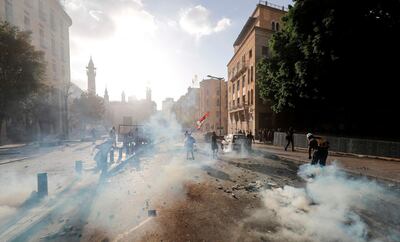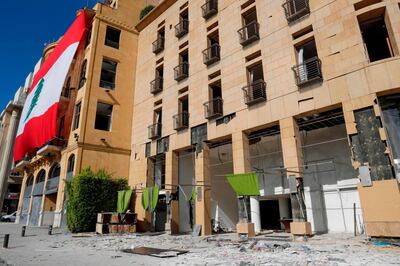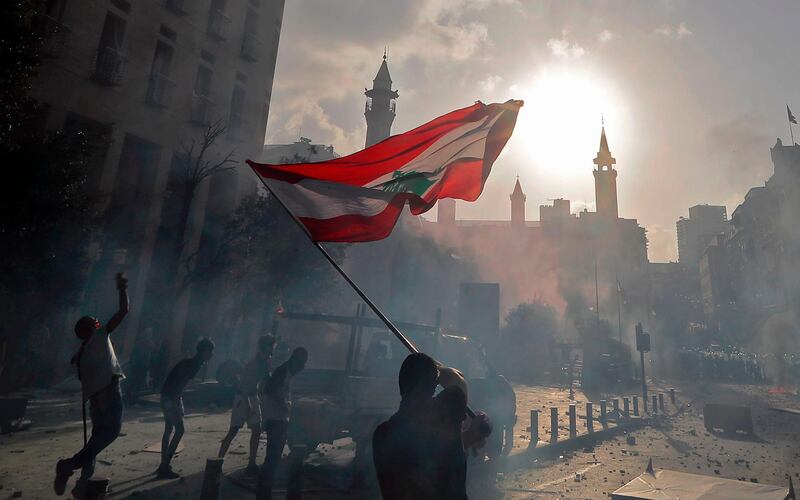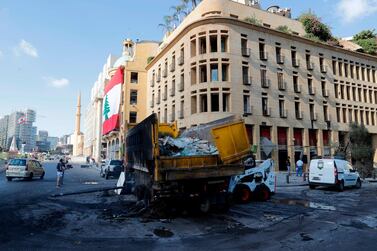Lebanon’s economy will contract far deeper than previously forecast, shrinking 24 per cent this year, compared with an earlier 15 per cent estimate, as a result of last week's Beirut port explosion, the Institute of International Finance said.
The explosion, blamed on 2,750 tonnes of ammonium nitrate stored at the port, killed at least 158 people, and wounded more than 6,000. More than 300,000 people have been made homeless and the damage is estimated to exceed $7 billion (Dh25.7bn), or about 14 per cent of the country’s gross domestic product last year, the IIF said.
“Given the large contraction in output and the massive depreciation of the parallel exchange rate, GDP could shrink from $52bn in 2019 to $33bn in 2020,” Garbis Iradian, the IIF’s chief economist for the Mena region said shortly before Lebanon's government resigned on Monday.
“Wages are falling sharply in real terms as the pass-through effect from the large parallel exchange rate depreciation led prices to rise rapidly.”
Prior to the explosion Lebanon was already facing its worst economic crisis since its independence in 1943. It defaulted on $31bn in eurobonds in March which led its currency, pegged to the US dollar, to lose more than 80 per cent of its value against the greenback in the black market. Inflation surged, which led the government to turn to the International Monetary Fund in May for a $10bn bailout package.
With IMF talks stalled, inflation is likely to have exceeded 110 per cent in July, while unemployment and poverty rates climbed to 35 per cent and 50 per cent respectively, the Washington-based IIF said.
“The government and parliament have wasted much time on debating the scale of losses of the banking system and on blaming opposition political parties and foreign governments for the lack of international financial support,” Mr Iradian said.
Though Lebanon received pledges of $300m at a donor conference organised by France and the United Nations on Sunday, there are food security concerns after the explosion devastated its primary grain silos at the port.
The country’s ports in Tripoli and Sidon are much smaller than Beirut’s port, which handled at least 70 per cent of imports.
Lebanon’s current account deficit is projected to narrow because of the collapse in domestic demand to 12 per cent of GDP from 22 per cent, according to the IIF. Official reserves are expected to decline by about $7bn to $12bn by the end of 2020, it said.
Economic reform is a key perquisite for IMF assistance and the ability of the country to access $11bn pledged by donors at a 2018 conference. Reforming and limiting further deterioration will “require addressing Lebanon’s endemic corruption head-on”, Mr Iradian said.
“Doing so will require strong political will to create effective institutions that promote integrity and accountability throughout the public sector."
The adoption of new technologies could help strengthen key fiscal functions, including budget processes and revenue administration, as well as internal controls, according to the IIF.
"The independence of the Lebanese judicial system is often challenged by political interference. An anti-corruption legal framework should include legislation criminalising different types of corruption and provide a code of conduct and rules of disclosure for public officials," Mr Iradian said.
"However, it is unlikely that the current leadership will approve the necessary laws to fight corruption.”

Until Lebanon forms a new government that meets the demands of protesters the outgoing cabinet, according to the country's political system, serves as a caretaker government, but won't have a mandate to implement any reforms or advance talks with the IMF.
The IIF said there are two scenarios that could play out in the medium term. It assumed there is a 60 per cent probability that there will be significant political change and real economic reforms. That includes the formation of a new government, independent of sectarian allegiances, that have defined and held the country back from implementing necessary reforms since the end of its last civil war in 1990.
Under this scenario, IMF reforms are implemented, the aspirations of citizens are met, and early parliamentary elections are held.
“The state also needs to reduce its footprint in the economy by adopting a hands-off approach to managing vital sectors such as electricity and telecommunications and allowing private sector participation, including in the reconstruction of the Beirut port,” Mr Iradian said.
Under this scenario, the Lebanese pound could appreciate to below 6500 pounds to the dollars by early 2021 in the parallel exchange rate, with inflation gradually declining. The country would be able to access donor funds and secure financial assistance from the IMF, with the central bank shoring up its reserves, according to the IIF.
“Without political change and real economic reforms, the country will continue to sink,” Mr Iradian said.

Given the “magnitude” of the Lebanon’s problems, limited reforms erode confidence further and the currency will depreciate, while inflation will remain high, according to the IIF.
“With these headwinds, the economy will continue to contract, and debt will remain well above 120 per cent of GDP by 2024.”








